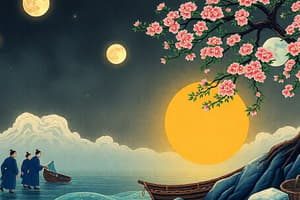Podcast
Questions and Answers
Which of the following is a characteristic of Chinese art?
Which of the following is a characteristic of Chinese art?
- Elegance and simplicity
- Vibrant colors and dynamic compositions
- Elaborate costumes and intricate choreography
- Intricate and detailed style (correct)
What is a characteristic of Korean performing arts?
What is a characteristic of Korean performing arts?
- Energetic and lively performances (correct)
- Intricate and detailed style
- Elaborate costumes and intricate choreography
- Elegance and simplicity
What is a characteristic of Japanese art?
What is a characteristic of Japanese art?
- Elaborate costumes and intricate choreography
- Vibrant colors and dynamic compositions
- Intricate and detailed style
- Elegance and simplicity (correct)
What is a characteristic of East Asian music?
What is a characteristic of East Asian music?
Which of the following is NOT a medium of East Asian visual arts?
Which of the following is NOT a medium of East Asian visual arts?
What is a characteristic of East Asian arts?
What is a characteristic of East Asian arts?
What is a characteristic of Japanese music?
What is a characteristic of Japanese music?
What is the goal of alternative artistic practices in East Asia?
What is the goal of alternative artistic practices in East Asia?
What is a notable feature of Korean music?
What is a notable feature of Korean music?
What is the significance of East Asian music in the global context?
What is the significance of East Asian music in the global context?
What is the role of alternative artistic practices in East Asia?
What is the role of alternative artistic practices in East Asia?
What is the common thread among East Asian arts?
What is the common thread among East Asian arts?
Flashcards are hidden until you start studying
Study Notes
East Asian Arts
East Asian arts encompass a wide range of artistic expressions from the cultures of China, Korea (both North and South), and Japan. These arts include visual arts, performing arts, and music, and are characterized by their rich history, cultural significance, and unique styles.
Visual Arts
The visual arts of East Asia have a long and distinguished history, with various mediums such as painting, calligraphy, jade, lacquerwork, and pottery being central to the artistic expression of these cultures. Chinese art, for instance, is renowned for its intricate and detailed style, while Japanese art is known for its elegance and simplicity. Korean art, on the other hand, is characterized by its vibrant colors and dynamic compositions.
Performing Arts
East Asian performing arts include a variety of traditional and contemporary forms, such as dance, theater, and music. Chinese performing arts, for instance, are known for their elaborate costumes, intricate choreography, and rich storytelling. Japanese performing arts, such as Kabuki and Noh, are characterized by their refined and stylized performances, while Korean performing arts, such as Pansori and Nongak, are known for their energetic and lively performances.
Music
East Asian music is diverse and rich, with distinct traditions in each country. Chinese music, for example, is known for its complex harmonies and intricate instrumentation, while Japanese music is characterized by its melodic and expressive qualities. Korean music, on the other hand, is known for its dynamic rhythms and powerful vocals.
Alternative Artistic Practices
In recent years, alternative artistic practices have emerged in East Asia, challenging traditional norms and emphasizing the role of art in social transformation. These practices include workshops, collaborative art projects, and creative interventions in urban public spaces. They aim to bridge the gap between art and everyday life, and to promote social justice and environmental sustainability.
East Asian Music in the Global Context
East Asian music is not only important within its own cultural context, but also in the global context of music. The music of East Asia has influenced and been influenced by the music of other regions, creating a rich and diverse musical landscape.
In conclusion, East Asian arts are a testament to the rich cultural heritage of the region. From the visual arts to performing arts and music, these arts continue to evolve and adapt to the changing times while maintaining their cultural significance. The emergence of alternative artistic practices further underscores the dynamic nature of East Asian arts, as they continue to play a role in shaping the cultural landscape of the region.
Studying That Suits You
Use AI to generate personalized quizzes and flashcards to suit your learning preferences.




